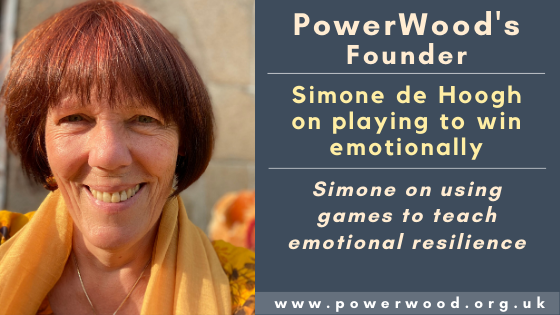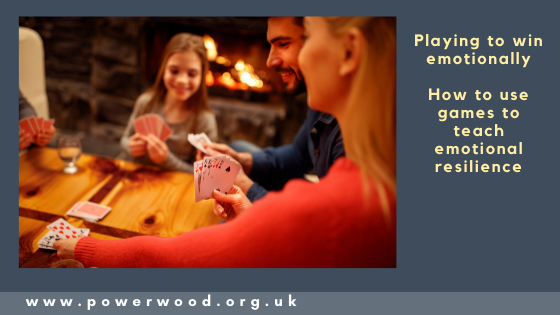
Including ‘Happy Families’ one of the tools within the Multilevel Emotion Regulation Theory (MERT) developed by Simone de Hoogh.
While we are cooped up with our family during this third lockdown, this might be an ideal circumstance to help our children master their emotional reactions when playing games.
“You are a cheater! I hate this game, I always lose! I hate you all”. My son threw the board with all the pieces through the room and stormed off angry. – Mum of a ten-year-old
Children with psychomotor overexcitability (OE) can be very competitive, and might have a hard time losing or even finishing a game without angrily throwing the boards and all its pieces around the room. If this is combined with emotional OE the child can withdraw for days feeling utterly lost about their own emotional reaction. Children with intellectual OE might try to argue themselves out of losing, by disputing the rules, cheating etc. setting the family up for an argumentative escalating disconnection.
If you feel it is helpful (and only then as with some children it might be better just to do it without discussing and you know your child best) you can first prepare a Parenting Pitch, in which you include that you want to help your child to learn to cope with the emotions caused by losing or winning. You can use the pitch to explain the importance of learning to cope with winning or losing as your child is probably unaware how it will influence their adult life if they cannot cope with being on different levels compared with others.
Parenting Pitch
A possible parenting pitch might be:
“I’m your mum and responsible for you having a good start in life and enabling you to be in charge of your emotional reactions. That includes being able to stay calm when losing or winning a game and we are going to make sure you have that in your pocket.”
There has to be a difference
“There is always someone that will be above you and someone who is below you in whatever ability, knowledge level, understanding or sensitivity etc, and you have to learn to be kind to yourself and others.”
You could for example say to your child: “Who do you want to be the boss, YOU or your emotions?”
As a parent, be really clear about what you see as calm, if you think it’s helpful to discuss it before you play, and make a chart where you keep tabs on who ‘wins’ a game (and I mean stay composed when losing or winning according to the changing roles).
An interesting discussion who will get which heart…. Will it be a green heart 💚, if we are kind and compassionate whether we lose or win; a yellow heart 💛 if we are still in charge of how we behave however have some not so kind feelings; or an orange heart 🧡 if we feel overwhelmed and use only our words to react on it; or a red heart ❤️ if we shout, throw the cards around or run of to our room.
Try to stop playing before a red ❤️ heart has to be dealt.

Otherwise just introduce helpful ways of playing games into family life without mentioning the reason.
Playing Happy Families
The easiest way to help children to play a game and learn to lose is to turn the situation around or create a game within a game.
The card game ‘Happy Families’, checkers or chess, for example, are good tools.
The rules are different though. You win when you lose AND you stay calm OR you win when you win and are very compassionate to the loser.
You can also swap the rules for each game. This appeals to the competitive drive that most children have who don’t like to lose and changes focus from the outcome to mastering the new challenge. It’s messing up their neurological pathways around winning and allows for bigger flexibility.

Build up really slowly if a child has resistance to any game, or gets very upset at the thought of losing. You might want to start with playing for several minutes then stop and say you are going to continue the next day so the child experiences that he or she can play without getting upset.
You might want to roleplay losing a game and getting absurdly upset to get them laughing, laughter is a very handy tool to relax children.
Practise, practise, practise
You could for example play every day during the week and if your child has won (stayed calm) more than a certain number of games, they are to choose the different rules to make it as hard for you as they can.
Make sure you lose once in a while and make a terrible show of losing your calm terribly, children love it:)!
The longer you play together, and the more your child increases their ability to stay calm, the harder you are going to make it – introduce teasing, teasing remarks, laughing at them when they lose, cheating etc. to really prepare your child to play games outside the family.
Have fun playing games!
© Simone de Hoogh 2021
Help us to continue support to all neurodiverse families and individuals
During these challenging times PowerWood facilitates access – also to non-members – to all information, tests, strategies and tools.
PowerWood offers to (self)-isolating families understanding, simple tools and strategies that enable us and our children to support ourselves and our children through emotional overwhelm. If you enjoy reading the articles please support PowerWood by becoming a PowerWood Community FreeBee or Friend member. Thank YOU!
